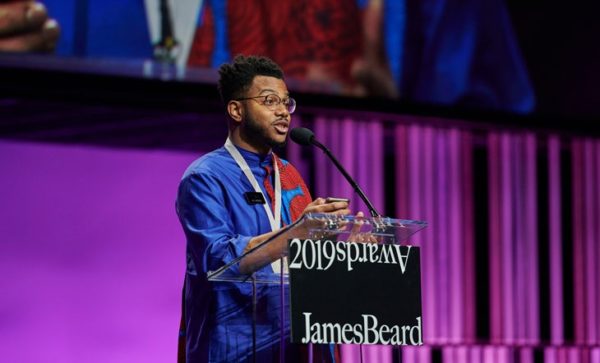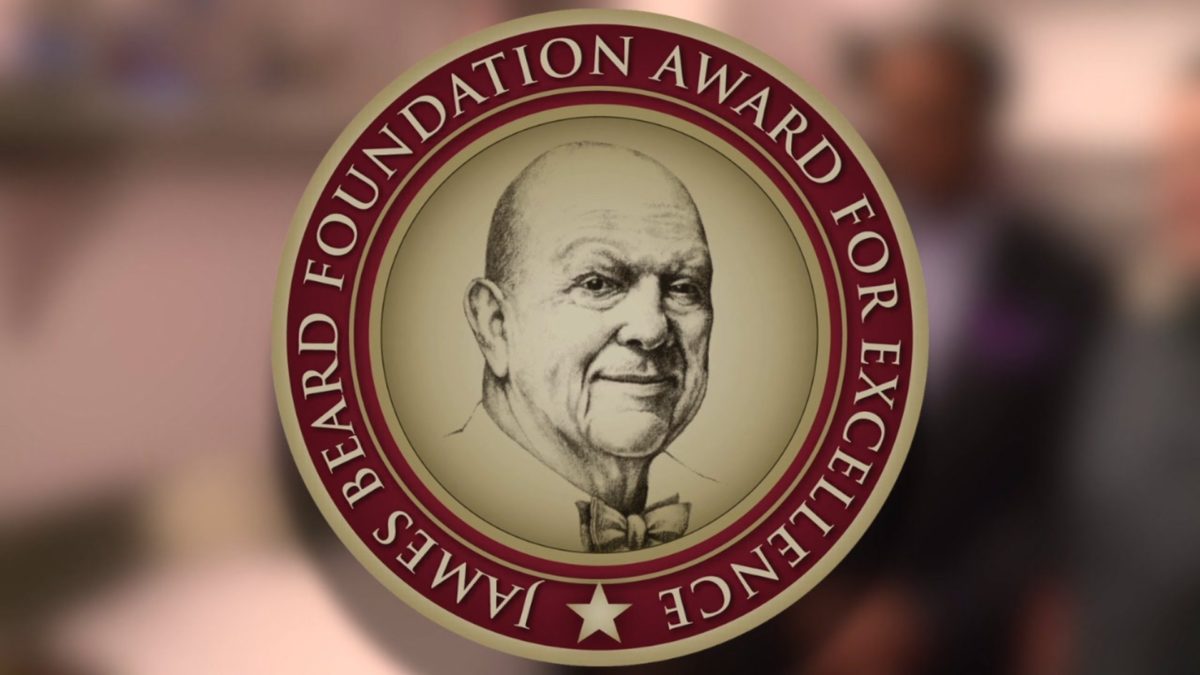As with most everything else that has transpired in 2020, the annual James Beard Awards has been shrouded in uncertainty. After initially delaying the announcement of this year’s Best Chef and Outstanding Restaurant nominees due to the onset of the Coronavirus pandemic, the organization eventually settled on holding a virtual ceremony in late September to reveal the winners.
This week, the Foundation reversed course yet again by canceling this year’s program altogether without revealing the winners. In a statement, Clare Reichenbach, the CEO of the Beard Foundation, wrote, “The uncertainty of this time for our industry is already a hard reality and considering anyone to have won or lost within the current tumultuous hospitality ecosystem does not in fact feel like the right thing to do.”
According to a scathing article in the New York Times that followed, Pete Wells reported that the Foundation’s choice to conceal the winners was marred by internal controversy. His article suggests that there were serious concerns among JBF’s senior leadership that this year’s list of honorees wasn’t diverse enough.
The organization was also privately struggling to parse allegations of unethical conduct made against numerous chefs on this year’s ballot. Even though some of the accused parties had already withdrawn their names from consideration, the Foundation was reluctant to honor chefs whose improprieties might overshadow the event.

This controversy is only one in a litany of others faced by the Beard Foundation in recent years. The nominating process itself was exposed for its inherent favoritism toward white, male chefs, resulting in an overhaul of the jury process over the last several nominating cycles.
There is no doubt that JBF executives are acutely aware of their own failure to fairly represent the changing face of the restaurant industry on the Awards stage. What’s unclear is whether or not the current leadership is capable of making the necessary changes to reimagine the JBF Awards in a way that lives up to the promise of diversity and inclusiveness.
Whether the Beard Foundation wittingly or unwittingly buried this year’s list of winners to avoid embarrassment belies a more important question that no one—food media acolytes and JBF executives alike—seems to have the courage to ask: Do the James Beard Awards serve any meaningful purpose anymore?
The existential crisis caused by the COVID-19 pandemic has hastened an unexpected reckoning where restaurant owners, even the most successful, are chewing off their own limbs to survive. This is no time for pageantry.
Although many refer to the Beard Awards as the Oscars of the restaurant industry, the ceremony itself doesn’t have nearly the same storied history. In fact, the Foundation’s role as an ombudsman for restaurant excellence only began in 1990. Looking back at its legacy, it’s always been in the interest of self-preservation that the JBF Awards blissfully sprinkles confetti over the scabs and bruises of a deeply dysfunctional industry. It has no raison d’ être without the illusion that restaurant work is glamorous.
In some ways, the almost mythological coronation that accompanied being awarded a Beard exacerbated the industry’s backwardness. Chefs have always been a competitive bunch. Giving out medals every year only made the industry more susceptible to its own barbarism.
Regarding race and gender bias, the Beard Awards has always been a symptom of the restaurant industry’s dysfunction more than the cause of it. But its existence has helped to perpetuate a narrative that white, male chefs—even ones that cook food from cultures other than their own—deserve the highest accolades. The Foundation’s latest misstep suggests that its recent efforts to be more inclusive have fallen significantly short. According to the New York Times article, not a single Black Chef was voted best in all twenty-three categories, both regionally and nationally.
The press release cancelling this year and next year’s Awards included commentary on JBF’s plan for the future and its commitment to eliminating systemic bias. According to this statement: “The objectives are to… increase the diversity of the pool of candidates, maintain relevance, and align the Awards more outwardly with the Foundation’s values of equity, equality, sustainability, and excellence for the restaurant industry.” The Foundation plans to enlist the services of an outside “social justice agency” to provide counsel for these initiatives.
While these measures are admirable, the restaurant industry shouldn’t be looking to JBF to solve its equity problems and ethics issues. The Foundation’s yearly awards subconsciously promote a culture that views restaurants as something to be compared and judged. This fosters a divisive spirit where chefs and restaurants are commoditized in a way that prizes their contribution to gastro-tourism over their role in serving their communities.
The New York Times story is particularly vexing as it pertains to issues surrounding how a chef’s conduct might impact his or her eligibility for a Beard Award. The article cites several recent examples of chefs, including Jessica Koslow of Sqirl in Los Angeles (of moldy jam fame), who have extricated themselves from the list of nominees amidst allegations of abusive behavior towards employees.
Though its intentions may be pure, the Foundation shouldn’t so easily absolve itself of its hand in creating the cutthroat competition that contributes to many of the dysfunctional behaviors that occur inside Beard-decorated restaurants or among the hopefuls. That said, the industry also shouldn’t expect JBF, or any other external organization, to act as arbiters of morality for its own dysfunctional workplace. The sad truth is that a lot of chefs are dicks, and many of them will continue to be dicks whether they have a medal around their neck or not.
A more complicated piece to the puzzle for the Beard Awards going forward is that the traditional definition of a restaurant will likely change out of necessity. Safety precautions implemented due to the pandemic have forced many restaurants to adapt their business models to be more flexible—including developing grocery options, selling meal kits and offering in-house delivery. There will be less emphasis on table service until following CDC guidelines is no longer a precursor to serving guests.
The JBF Awards have historically bestowed the most recognition on upscale restaurants that offer full-service, sit-down experiences, especially those that feature elaborate tasting menus with multiple courses. That business model may no longer be tenable in a post-pandemic world.
The Beard Foundation deserves credit for its many charitable initiatives, including its unflappable support of the restaurant industry in recent months. Throughout the COVID-19 crisis, it has led a noble effort to raise funds to support independent restaurants across the country through its Open For Good program.

There is no question that the Beard Foundation’s existence raises awareness and appreciation of diverse food cultures and, at its best, helps to promote industry figures with expertise to enliven the culinary pursuits of its constituents. But the Beard Foundation’s financial health and foundational mission shouldn’t be pinned so tightly to an annual popularity contest that decides who stays and who gets voted off the island every year.
The pandemic crisis and Black Lives Matter movement have caused the industry to dismantle the pale, patriarchal system that has systematically excluded women and people of color from proper recognition in the kitchen. Whether by design or not, culinary awards have always mirrored that dysfunction and helped perpetuate it. The dogmatic pursuit of Michelin stars, glowing reviews, and acknowledgment from the Beard Foundation has taken an irreversible psychic toll on restaurant professionals. Not by choice, but because the success of their restaurants often depends on it.
The James Beard Foundation may have squandered a golden opportunity to reinvent itself. Why not make a bold statement by choosing to honor chefs and restaurateurs not by judging their work against others’ but by celebrating individual achievement unbound by culinary discipline, geographic location, or level of formality? If the James Beard Foundation truly cares about the future of restaurants, it will take this moment to repent and refocus its mission around its namesake’s legacy—celebrating the simple act of cooking well without pretense.


The author raises several important points with regards to the relevance of these awards moving forward. The most significant of which, in my opinion, is the notion these judgments and accolades create divisiveness rather than camaraderie. I think we may be better off without such public displays of ego and separatism at this point in time.
“The sad truth is that a lot of chefs are dicks, and many of them will continue to be dicks whether they have a medal around their neck or not”
Hahahaha.
How real is that?
I started in food in the late 70s. It was ugly during the cocaine years. The definition of sexual harassment and abuse through manipulation. There was alotta Harvey Weinstiens(sp) out there.
Now there’s interns. Working for nothing but the privilege. Spare me. Trotter in For Grace is just another form of Weinstein.
[…] results revealed no people of color among this year’s honorees, the Foundation elected to cancel the program and conceal the […]
[…] Adam Reiner | Jan 13, 2021 | News | 0 […]